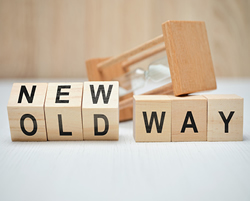Adaptability has helped employees thrive and grow during change. Ashish Kothari, Kate Lazaroff-Puck and Sasha Zolley* offer up ways to cultivate it quickly and at scale.
 Change is constant, unpredictable, necessary, and extremely difficult all at once.
Change is constant, unpredictable, necessary, and extremely difficult all at once.
For many people, constant change at work—ongoing transformation, different ways of working, demand for new skills—is a significant cause of chronic stress.
According to the World Health Organisation, even before COVID-19, the global stress epidemic was costing the world at least $1 trillion annually just in measurable areas like absenteeism, and likely much more in innovation and creativity—two of the very things humans need for the future of work.
Yet, some have thrived and grown during this change by exercising one evergreen meta-skill: adaptability.
It’s no wonder that adaptability consistently lands at the top of desired employee skills, cited by HR and executives alike, a McKinsey survey found.
We surveyed over 70 academic articles to define strength in adaptability and found three essential characteristics:
- Proactively managing physical, mental, and spiritual well-being.
- Cultivating the habits of a lifelong learner by seeing the world as a laboratory and not an exam, with the right mix of learning mindsets, such as beginner, growth, and exploration.
- Nurturing relationships and teams that promote well-being and learning; for example, being the team catalyst for psychological safety.
How can leaders help employees cultivate this skill quickly and at scale? Doesn’t this take years to develop, working with expensive coaches on retreats in faraway locales? Not only does the literature agree that adaptability can be taught, but leading organisations are already measurably improving this skill at enterprise scale in a matter of months.
How?
1. Normalize and build skills.
Leaders should underscore the importance of adaptability and create common language and skills through capability building.
Facilitator-led workshops or self-paced, digital modules that give employees the language and theory of adaptability, while prompting self-awareness and insights, are great starting points.
For example, one company held workshops for top leaders, then made the same content available through self-paced, digital learning to more than 50,000 employees, creating a common language, concept awareness, and a call to socially practice in teams.
2. Reinforce.
Use social and nudge components to reinforce key behaviours.
Apps or emails can sustain learning by offering concrete tips to employees to practice adaptability during their next meeting or difficult situation.
Social learning is even better.
For example, companies can share “discussion kits” that teams can use to gauge and improve their adaptability.
Role modelling by leaders and influencers is also critical.
3. Measure.
To truly build institutional capability in adaptability, it is critical to track progress.
We worked with one organisation to create a feedback tool that program participants could use to rate their own behaviours and outcomes, including performance, well-being, and ability to handle change.
The company found that everyone who engaged with the program improved their adaptability against a control group, and highly engaged participants more than tripled the gains compared to control, according to personal and colleague observations.
Further, the group that was most engaged with the program had the lowest starting scores, suggesting that even if adaptability doesn’t come naturally, it can be improved with high-quality capability-building programs.
Strengthening adaptability is most important when things are stressful.
Adaptability is a cornerstone to thrive in the volatile, uncertain, complex, and ambiguous (VUCA) environment of the 21st century global economy, as employees return to the office and face new unknowns at an increasing pace.
Paradoxically, this is the hardest time to do so, as people can become even more rigid in old habits and mindsets when under stress.
Although capability building has proven effective, very few employers invest in any form of adaptability skill-building.
Enterprise leaders would be well-served to address both this paradox and their organisational needs by investing in employees to cultivate adaptability through these proven techniques.
*Ashish Kothari helps executives unlock and accelerate transformational change. Kate Lazaroff-Puck builds and deploys leadership capability-building programs and employee engagement strategies. Sasha Zolley leads leadership and management capability building programs within McKinsey Academy.
This article first appeared at mckinsey.com.











